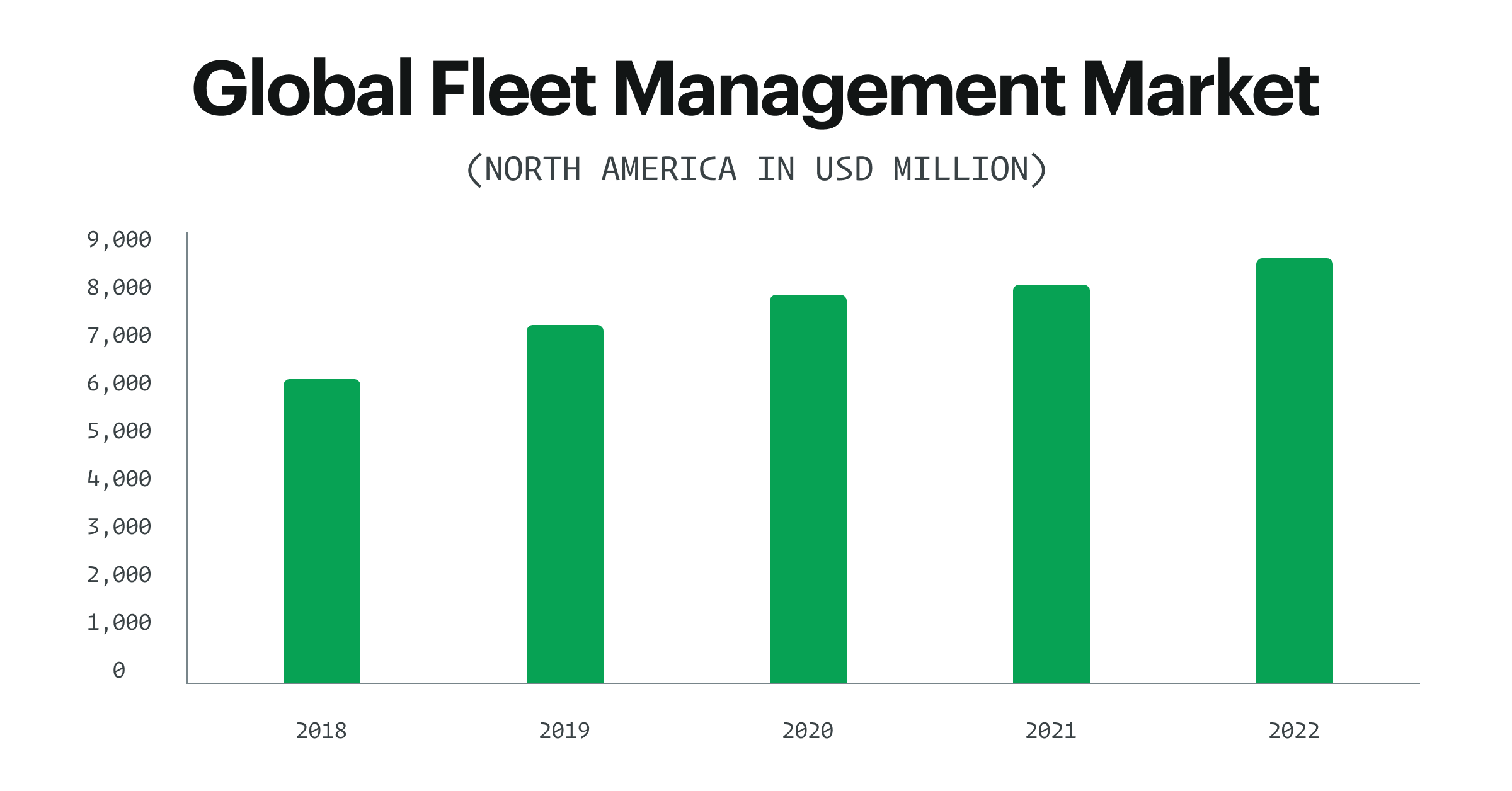Fleet Management Market: Size, Trends & Opportunities
The fleet management market’s current size and projected growth highlight its crucial role in empowering businesses to achieve operational excellence and competitive advantage. More companies are recognizing the value of fleet management in minimizing risks, improving efficiency and optimizing resources.
Jul 21, 2023
9 min read

Jump to a topic
Fleet Management Market Size
The fleet management industry has experienced booming growth in recent years, and its trajectory shows no signs of slowing down, with a market size exceeding USD 18 billion in 2022, according to Global Market Insights (GMI). The industry’s growth can be attributed to such factors as the rising need to optimize fleet operations, enhance productivity and streamline supply chain management. GMI posits that the fleet management market is projected to grow over 15 percent compound annual growth rate (CAGR) from 2023 to 2032.
Businesses can implement fleet management software (FMS) and other fleet solutions to help keep up with growth and demand while reducing unnecessary expenses. Adopting robust fleet management technologies can be crucial for organizations seeking to thrive in a rapidly evolving business landscape. By leveraging these solutions, fleets can mitigate vehicle investment risks, improve efficiency and achieve a competitive edge in the market.

Key Market Drivers
The fleet management market’s growth has been driven by various factors. According to Data Bridge Market Research analysis, these factors include the rise in fleet safety concerns, increased demand due to the e-commerce boom and the focus on improving customer services.
Growing Fleet Safety Concerns
Fleet safety is a top priority for fleets and, according to Markets and Markets, a primary driver of fleet management market growth. Fleets are increasingly turning to fleet management solutions to help improve fleet safety management and mitigate both the physical and financial risks of work-related accidents. FMS and other solutions provide real-time data on driver behavior, vehicle location, maintenance needs and other safety-related factors. By leveraging fleet technologies for data-driven insights, businesses can proactively monitor and improve driver safety, reducing the risks associated with fleet operations and enhancing overall operational efficiency.
Increased Demand for Logistics Due to E-Commerce
The expansion of the e-commerce industry over the past few years has significantly impacted the logistics sector, and fleet management plays a pivotal role in meeting its ever-changing demands. With the exponential growth of the e-commerce segment, logistics companies are under pressure to adapt and scale their operations effectively. Fleet management solutions enable logistics businesses to navigate this landscape, ensuring consistent, reliable, efficient and error-free deliveries.
Rise in Demand for Improvement of Customer Services
In today’s competitive market, customer satisfaction and retention are vital for long-term success. Customers now have higher expectations, and businesses must go the extra mile to deliver exceptional experiences. By leveraging advanced technologies and data-driven insights, businesses can streamline their fleet management processes, improve route planning and enhance overall efficiency.
As the fleet management industry continues to evolve, embracing these driving forces and leveraging fleet technologies will be crucial for businesses to stay competitive and capitalize on the expanding market opportunities. By prioritizing fleet safety, adapting to the e-commerce boom and enhancing customer services, organizations can unlock the full potential of their fleet management operations and drive success.
Fleet Management Market Trends
The latest fleet industry trends affecting the market include the integration of advanced technologies — including fleet management software (FMS) — the rise of connected vehicles, the growing demand for data-driven insights and the push toward sustainability.
Integration of Advanced Technologies
Advanced technologies are driving innovation in the fleet management space. Not only are fleets making the move toward implementing fleet management solutions, they are increasingly adopting such technologies as artificial intelligence (AI) and Internet of Things (IoT) to optimize their fleet operations.
AI-powered algorithms and machine learning enable intelligent route planning, predictive maintenance and real-time monitoring of vehicle performance, while IoT devices provide valuable data on vehicle location, fuel consumption and driver behavior. These technologies, especially when integrated with FMS and other fleet solutions, help businesses make data-driven decisions, enhance operational efficiency and maximize fleet productivity and profitability.
Rise of Connected Vehicles
The increase of connected vehicles in fleet has evolved the role of fleet management, enabling seamless communication and data flow between vehicles and other fleet assets, drivers, technicians, fleet managers and stakeholders. Connected vehicles equipped with advanced sensors and telematics systems collect real-time data on vehicle performance, fuel consumption and driver behavior. The integration of connected vehicles with fleet management solutions provides a comprehensive view of the fleet’s health and performance, allowing for proactive decision-making and streamlined operations.
Growing Demand for Data-driven Insights
Data has become the lifeblood of effective fleet management. Businesses are increasingly relying on data-driven insights to optimize their operations and improve decision-making. Fleet management solutions capture vast amounts of data on asset performance, asset usage and fleet utilization, service and inspection histories, fuel consumption and driver behavior.
By analyzing this data, businesses can identify trends, detect inefficiencies and make informed decisions to improve fleet performance and reduce unnecessary spend. Furthermore, real-time fleet monitoring helps fleets move from reactive to proactive maintenance, minimizing downtime and reducing repair spend.
Emphasis on Sustainability
Sustainability has emerged as a crucial driving force in the fleet management industry, whether due to regulations or simply the desire to “go green.” Electric vehicles (EVs) are gaining popularity as businesses seek to transition to more sustainable fleet operations. The integration of EV charging infrastructure and the use of renewable energy sources further contribute to sustainable fleet management practices.
Fleet Management Market Challenges
The fleet management industry presents various challenges that can impact a business’s success. By understanding and proactively solving fleet management challenges, businesses can strengthen their operations, enhance efficiency and achieve sustainable growth. So, let’s hit the road and discover how to navigate the challenges in the dynamic world of fleet management.
Rising Operational Costs
One of the most prevalent challenges in fleet is the continuous increase in operational costs. Factors such as fuel prices, maintenance expenses, insurance premiums and compliance requirements contribute to the financial burden faced by fleets. To tackle these challenges, businesses can leverage technology and data analytics to optimize fuel consumption, implement proactive maintenance strategies and explore insurance options tailored to fleet management. Implementing cost-saving measures and efficient resource allocation can help fleets mitigate the impact of rising operational costs.
Driver Shortage and Retention
Finding and retaining skilled drivers is one of the most cited challenges in the fleet industry. The shortage of qualified drivers, coupled with high turnover rates, poses significant hurdles for businesses. To address this challenge, companies can focus on driver recruitment and retention strategies that prioritize fair compensation, training and development programs and fostering a positive work environment. Investing in driver satisfaction and engagement can enhance retention rates, reduce recruitment costs and improve overall operational efficiency.
Technology Adoption
While technological advancements in fleet offer immense potential, integrating new technologies into existing operations can be a complex undertaking. The adoption and integration of technologies like telematics systems, FMS and IoT devices require careful planning, employee training and fleet-wide buy-in. Overcoming this challenge involves selecting the right technology partners, providing comprehensive training to employees and ensuring smooth integration into daily operations. By embracing fleet technologies and overcoming the initial challenges, businesses can reap the benefits of improved efficiency and data-driven decision-making.
Regulatory Compliance
The fleet management industry operates within a complex regulatory environment. Compliance with regulations related to safety, emissions, hours of service (HoS) and driver qualifications is essential, but it can be challenging to navigate. Staying up-to-date with changing regulations and leveraging technology for monitoring and reporting can help businesses overcome this challenge. Collaborating with industry associations, attending fleet management conferences and engaging in continuous education and training helps fleets remain compliant and avoid penalties and reputational damage.
Data Security and Privacy
With the increasing use of connected devices and data-driven technologies, fleets face significant challenges related to data security and privacy. Implementing robust data security measures, including comprehensive employee training on data privacy and partnering with trusted technology providers, can help mitigate these risks.
While the fleet management industry offers abundant opportunities, it’s not without its challenges. Embracing innovative solutions, fostering a driver-centric culture, leveraging technology and prioritizing compliance and data security can strengthen operations and ensure long-term growth.
Fleet Management Market Opportunities
The fleet management industry is ripe with growth opportunities for businesses. By embracing fleet technologies, addressing evolving customer needs and optimizing fleet operations, businesses can unlock new avenues for growth and success. As the industry continues to evolve, staying ahead of the curve and seizing market opportunities will be crucial for businesses aspiring to become industry leaders.
Technological Advancements
Technological advancements continue to shape the fleet management industry, presenting a wealth of opportunities for businesses. The adoption of advanced fleet technologies enables businesses to enhance operational efficiency, improve resource allocation and streamline workflows. Using real-time asset tracking and equipment management solutions, businesses can make data-driven decisions to elevate their fleet management capabilities and gain a competitive edge.
Evolving Customer Needs
Customer needs and expectations are continuously evolving, presenting businesses with opportunities to differentiate themselves and pull ahead in their respective market. By aligning their services with evolving customer needs, businesses can cultivate long-term partnerships, foster customer loyalty and unlock new revenue streams.
Fleet Optimization and Cost Savings
Efficient fleet management is a top priority for businesses aiming to achieve cost savings and maximize profitability. Fleets can use available technologies like FMS, route optimization software, predictive maintenance solutions, fuel management systems and driver performance monitoring tools to streamline their operations, reduce fuel consumption, optimize vehicle utilization and extend the useful life of their assets. Fleet optimization not only results in cost savings, it also enhances overall productivity and customer satisfaction.
Fleet Management Solutions
With a wide variety of fleet management solutions on the market today, businesses have plenty of options to choose from. While this can be a good problem to have, it can also be overwhelming. Finding the right solution for your fleet operation can take time, and as we know in fleet, time is money. By making a list of short and long term operational goals, including how those goals will impact the overall business, fleets can better determine what solution will work best for their specific needs.
Find out how Fleetio can help put you ahead of the competition!
Schedule DemoSome fleet management solutions available today offer integrations with other fleet and business technologies to provide a more complete and well-rounded view into fleet health and overall operational efficiency. Taking stock of what operational data — business-wide — needs to be transparent and consolidated, for quick reporting and analysis, is essential when shopping for fleet management solutions. Using an integrated solution like Fleetio allows for automated data collection, consolidation and aggregation, putting the metrics you need on a customizable dashboard for quick, reliable insights.
Ready to take your fleet operation to the next level? Start your free Fleetio trial or request a personalized walkthrough today!
FAQs
What is the current size of the fleet management market?
The global fleet management market in 2023 is $18.69 billion.
Who are the prominent players operating in the fleet management market?
Key market players include AT&T, Inc., Cisco Systems, Inc., Fleetmatics Group Plc, Freeway Fleet Systems, IBM Corporation, I.D. Systems, MiTAC International Corporation, Navico, Telogis and TomTom N.V.

Senior Fleet Content Specialist
As a Senior Fleet Content Specialist at Fleetio, Rachael Plant uses her near decade of industry experience to craft practical content aimed at helping fleet professionals tackle everyday challenges with confidence.
LinkedIn|View articles by Rachael PlantReady to get started?
Join thousands of satisfied customers using Fleetio
Questions? Call us at 1-800-975-5304
